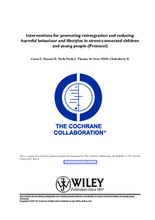This systematic review, co-registered within both the Cochrane and Campbell Collaborations, summarizes the evidence from empirical studies comparing the effectiveness of interventions that have been established to promote inclusion and reintegration, and to reduce harm, in street-connected children and young people (0 to 24 years old) who work and/or live on the streets worldwide. The review includes 11 studies, evaluating 12 interventions from high income countries, in particular the United States. No studies from middle and low income countries were included due to inadequate quality of available studies, according to the authors, and therefore the generalizability of the studies is questionable. A majority of the studies recruited participants through shelters, drop-in services or hostels. The review compares therapy-based services with traditional shelter and drop-in services and includes: an overview of the condition of street-connected children and the interventions utilized with this population, a description of the methodology used in the review and its incorporated studies, the authors’ findings from the review, a discussion of the results, and the authors’ conclusions along with recommendations for future research.
Of note, the review found that none of the studies had measured the impact of the interventions on primary outcomes, including reintegration. Instead only a limited number of secondary outcomes were targeted by the studies, in particular impact on certain forms of risky behaviors. Data were extracted on intervention delivery, context, process factors, equity and outcomes; and outcome measures were grouped according to whether they measured psychosocial outcomes, risky sexual behaviors, or substance use. Overall, the review found no significant difference in relation to these outcomes between participants receiving therapy based interventions and those receiving standard shelter or drop-in services. Instead, the data appears to support the conclusion that services need not be highly specialized or technical in order to foster some degree of positive change among street-connected children and youth recruited through shelters or drop-ins. The authors suggest that there is a great need for more research and thorough evaluation of interventions for street-connected children, especially in middle and low income countries where there are fewer adequate studies and where contexts for street-connected youth differ markedly from those of street children in high income countries.
©Coren, Esther; Hossain, Rosa; Pardo, Jordi Pardo; Veras, Mirella MS; Chakraborty, Kabita; Harris, Holly; Martin, Anne J

